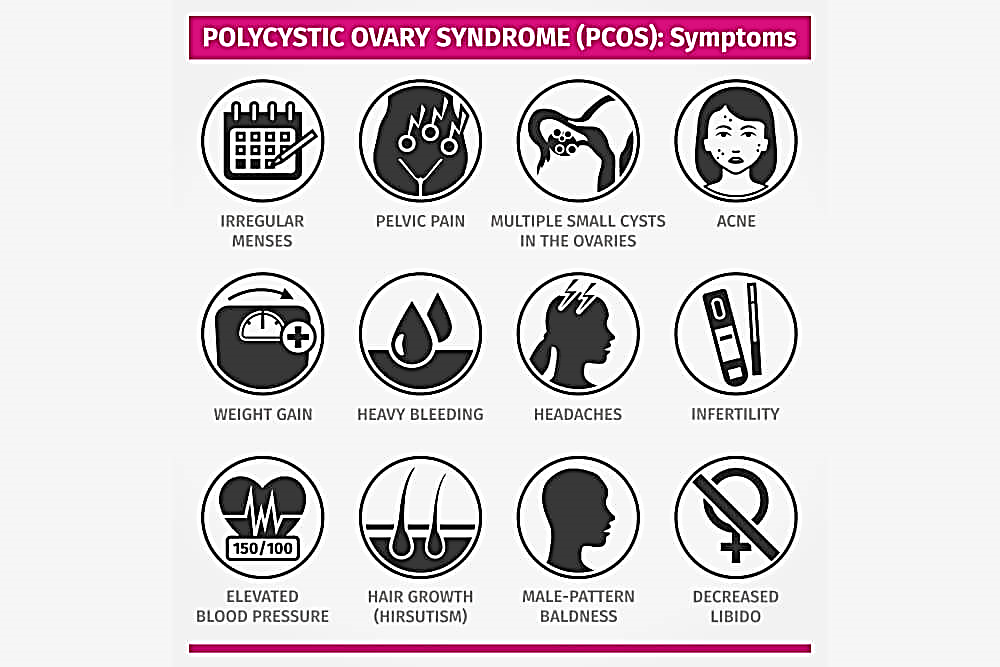
What is polycystic ovary syndrome?
Polycystic ovary syndrome, or “PCOS,” is a condition that can cause irregular periods, acne (oily skin and pimples), extra facial hair, or hair loss from scalp. The condition can also make it hard to get pregnant. It is very common – about 8 percent of all women have PCOS.
What causes PCOS?
In PCOS, the ovaries produce more male hormone ie androgen (like testosterone). Testosterone is called a “male hormone,” but all people have some testosterone. Normally the ovaries produce very small amounts, but in PCOS, they make more.
Every month multiple follicles grows from the ovary, they make many hormones, but eventually only follicle gets released known as the egg. This is called “ovulation.”
But in people with PCOS, the ovary makes many small follicles instead of one big one. Hormone levels can get out of balance. And ovulation doesn’t happen every month the way it is supposed to happen.
There are two main causes for this:
- Abnormal GnRH(a hormone controlling FSH/LH hormone that help in egg maturation) pulse
- Insulin resistance
What are the symptoms of PCOS?
Symptoms can include:
- Having fewer than 8 periods a year also known as oligomennorhea.
- Growing thick, dark hair on the upper lip, chin, sideburn area, chest, or belly
- Acne (oily skin and pimples on their face)
- Hair loss from the head
- Trouble getting pregnant without medical help (Infertility)
- Weight gain and obesity (although not everyone with PCOS has this problem)
What are the other problems that I can get due to PCOS?
PCOS increases your risk of other health problems, including:
- Diabetes (high blood sugar)
- High cholesterol levels
- Sleep apnea, a sleep disorder that causes people to briefly stop breathing while they sleep
- Depression or anxiety
- Eating disorders, such as binge eating or bulimia
What are the tests I should do?
Your doctor will decide which tests you should have based on your age, symptoms, and individual situation. Possible tests include:
- Blood tests to measure levels of hormones (FSH/LH/Testosterone/Prolactin/TSH levels), blood sugar, and cholesterol.
- A pregnancy test if you have missed any periods
- Pelvic ultrasound – Of your uterus and ovaries.
At times Insulin levels with other androgen levels are also measured if required
How is PCOS treated?
The most common treatment is to take oral combined hormonal pills (Birth control pills). But there are other treatments than can help with symptoms, too.
- Birth control pills – This is the main treatment for PCOS. The pills don’t cure the condition. But they can improve many of its symptoms, like irregular periods, acne, and facial hair. Birth control pills also lower your risk of cancer of the uterus.
- Anti-androgens – These medicines block hormones that cause some PCOS symptoms like acne and facial hair growth. Spironolactone is the one that many doctors use.
- Progestin – This hormone can make your periods regular, but only if you take it regularly. It also lowers the risk of cancer of the uterus. Most doctors use medroxyprogesterone.
- Metformin :– This medicine helps to reduce insulin resistance. In people with diabetes, this medicine helps to lower blood sugar levels.
- Medicated skin lotion or antibiotics to treat acne.
- Laser therapy or electrolysis to remove extra hair
Is there anything I can do on my own to treat the condition?
Yes. If you are overweight or obese, losing weight can improve many of your symptoms. Losing just 5 percent of your body weight can help a lot.
What if I want to get pregnant?
Most people with PCOS can get pregnant, but it is usually easier for those who are not overweight. If you are overweight, losing weight can help make your periods more regular and improve your chances of getting pregnant.
If you lose weight but your periods are still irregular, your doctor can give you medicines to help you ovulate and improve your chances of getting pregnant.

